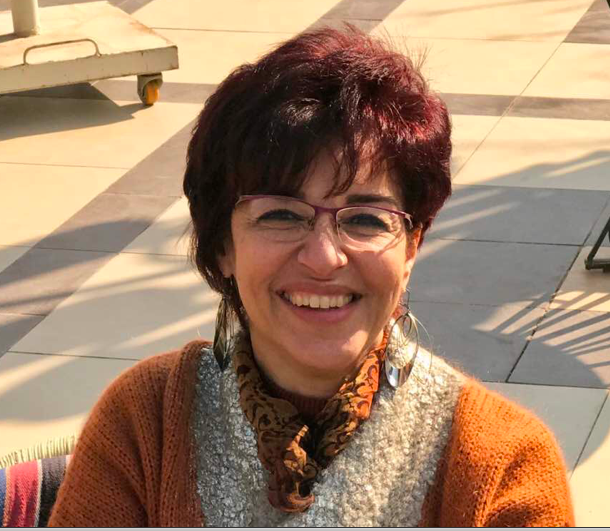
Konya Shamsrumi: What is the process of writing a poem like for you? Is it a lot of hard work or easy?
Sherin Darwish-Shash: A poem just. . . comes. After having hovered on the edges of my consciousness for a while, it asks to be laid down on paper. This ‘while’ is actually an amalgam of little moments of regret, moments of sadness, moments of anger, of bitter memories. Moments upon moments taking form as the narrative unfolds—because there always is a narrative, is there not, even when there isn’t. . . Then the words come with all strings attached and synapses firing until the poem is birthed. A loose-limbed little bundle that needs swaddling into a wieldy shape. Sometimes, the poem comes out screaming and kicking, sometimes it comes out quietly weeping. Sometimes the birth is easy. Other times, it takes many months.
Konya Shamsrumi: Please describe your sense of identity in this or any possible world in imagery or metaphor?
Sherin Darwish-Shash: My sense of identity is made up of the many places I have lived in; it is a lucky crystal of many facets, its different perspectives honed from different cultures. Like a polished diamond which looks unfailingly sparkly, people think that it was an easy task to accomplish. But it’s not. It is hard work. It’s on-going hard work.
English boarding school at a naive age of 15 gave me my first inkling of identity through my first taste of racial discrimination. When a lice outbreak invaded our girly scalps, it was my toasted skin colour that must have attracted them, it was my black Arab eyes and my frizzy, unmanageable African hair that was loudly accused. That attack was spearheaded by the Formidable Matron and followed by the blonde, blue-eyed hordes of English roses… (it turned out that the lice all came from this pale wraith of a girl, with a tea-cup complexion and washed-out eyes). Boarding school is where I was asked: “What makes you so strong?”. “God and my parents”, I would say. I found out that I would always hold precious the essence of me: my Muslim faith. But religion is a private matter, so that’s that.
Konya Shamsrumi: If any of your poems could literarily save a person’s life, which poem would it be and can you describe the person whose life you think it would have saved?
Sherin Darwish-Shash: If a poem of mine could save a person’s life, psychologically and at times literally, I would choose to gift him/her the one called Merryland. It is about the guilt made to be borne by the one for an expression of love different from that expected by the other: I initially wrote it about a child speaking to his/her father, but it can be read as one partner to another.
Rejection by a loved one is a very toxic situation: I have seen its damages in the child-parent relationship mostly, among adults, among teenagers and among children, having been a teacher for so long. . . The person who might need this poem would be the misunderstood person, the one disrespected because different in thought, the one who dances to a different tune and knows it and wants to assume it despite others. Not an extreme or contestable different tune, but just one at odds with his/her family or community traditions. At the stage when young people are looking to forge their own identities, it is very important that they be given a safe space to talk about their feelings and feel guided but not constrained or forced.
When I can, I do share this poem with them, and it helps self-perceived victims to see that it happens, that they are not automatically to blame, that parents are not paragons of virtue but that they are all, ultimately, also victims of their parents. . . Oftentimes, it has helped put things in perspective for my students, and it can be like a mantra that they can re-read in times of anguish.
Yes, in my own imperfect way
I love you.
And I try to remember
why great blotches of
indifference have uglied
the face of our love,
and I uncover weals
of long-ignored bruises and
unjustifiable rejection.
I once thought you were right
to punish me for unspeakable crimes,
for impromptu outings with friends
and highfalutin flights of rhetoric
you didn’t understand;
I thought I deserved to suffer for
independence of thought
and action.
Now, I see I’m at your mercy twice:
for depending on myself,
and for no longer depending on you.
Because of the twisted logic
of emotional blackmail,
I love you perfectly,
for your imperfect love.
Merryland
Sherin Darwish-Shash

Konya Shamsrumi: What does Africa mean to you, as potential or reality?
Sherin Darwish-Shash : Africa has been and always will be the object of all desire: by its resources, both biological and mineral; by the music by which every African atom vibrates; by the infinite possibilities ever renewed at African dusk and African sunrises. Africa is dream, is reality, is danger, is nurture, is freedom, is servitude, is bounty, is poverty, is gentleness, is violence, is the beginning and the end…
Konya Shamsrumi: Could you share with us one poem you’ve been most impressed or fascinated by? Tell us why and share favorite lines from it.
Sherin Darwish-Shash: So many impressive poems to share but one stands out. Not only on its own merit but also because it is forever linked in my mind to a feeling of comfort, a sense of ‘coming home’, of sweet and unexpected reunion. It is Ode on Melancholy by John Keats. My favourite lines are the following:
“But when the melancholy fit shall fall
Sudden from heaven like a weeping cloud,
That fosters the droop-headed flowers all,
And hides the green hill in an April shroud;
Then glut thy sorrow on a morning rose,
Or on the rainbow of the salt sand-wave,
Or on the wealth of globed peonies;…”
When I discovered Keats, I had been in that English boarding school for a whole, long, sad, lonely and cold year. No familiar landmarks, neither visual, nor cultural, nor social. And all my communication was in English, not my first-learned French. And suddenly here was Ode On Melancholy speaking to me in the very French Romanticism vein I knew well and cherished for having been cut off from it. It spoke to me of Victor’s Hugo’s sonorous Contemplations and Verlaine’s anguished Chanson d’Automne and Ronsard’s freshness of description of Nature… Ode on Melancholy, especially, allowed me to plunge again and again into that kind of much-missed comfort of a home which was 20 hours away by plane and had not yet been rendered closer by the marvelous invention of the Internet.
Sherin Darwish-Shash received her BA and MA Honours degrees from St. Catherine’s College, Oxford, in French & Spanish, where she was awarded the Top Scholarship in Modern Languages. She has lived in many countries as a child, before getting married and settling in Egypt with her husband. She has two wonderful sons and a lovely daughter-in-law, who are the pride of her life. Sherin has been teaching for the last 33 years, starting in Middle School, then at the High School and International Baccalaureate levels. For the past 7 years, she has been teaching various undergraduate University courses as full-time faculty in the Department of Rhetoric & Composition. She enjoys interdisciplinary connections through intellectual challenges, eclectic reading, translating and interpreting at various professional venues, collecting art, rowing and cultural travel with her family. She speaks five languages.













Wow!! I enjoyed reading that..impressive!! And her students love her!🤗💕
Amazed by your answers. you got me smiling.